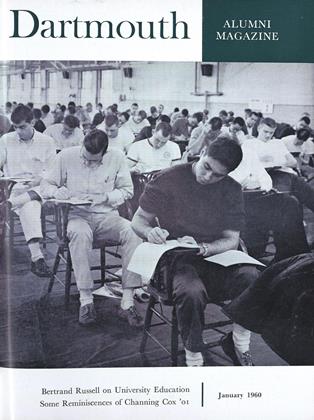FUNDS for the construction of the Army Corps of Engineers' Cold Regions Research and Engineering Laboratory (CRREL) in Hanover have been allocated by the Bureau of the Budget, and invitations for contractors' bids were sent out December 1. Construction of the facility, costing about $3,225,000, will begin next spring and will be completed two years later.
Announcement that the final green light had been given to CRREL was made at a November press conference in President Dickey's office, attended by Lt. Gen. Arthur G. I rudeau, Chief of Army Research and Development; Lt. Gen. E. C. Itschner, Chief of the Army Corps of Engineers; Brig. Gen. Aldon Sibley, Chief of the Corps of Engineers in New England; and U.S. Senator Norris Cotton, who along with Senator Styles Bridges and Congressmen Perkins Bass '34 and Chester Merrow, was instrumental in clearing the new research unit through Congress.
CRREL will combine two facilities of: the Army Corps of Engineers presently engaged in cold regions research. General Trudeau said the program here will be. balanced between research on the physical properties of snow, ice and permafrost, and the developmental aspects of engineering methods and techniques applicable to arctic and polar construction.
The new facility, to be built on 18 acres of Lyme Road land donated by Dartmouth College, will be a stone and brick structure with 72,000 square feet of floor space, including a basement and two stories. It will have a staff of about 170 persons, many of whom will come from the two existing research centers. General Itschner estimated that about eighty families will move to the Hanover area between now and 1962. Some forty of these will be interested in purchasing or building homes, and the Hanover schools will need to accommodate about 75 additional children. An annual payroll of nearly two million dollars will also have an impact on the expanding Hanover community.
Many eminent polar scientists will be working for CRREL, and no small part of Dartmouth's anticipation of the new research unit centers on the educational stimulus from this group. The combination of CRREL and Dartmouth's own developing program of polar studies holds out the exciting promise of making Hanover the foremost center of polar research and study in the free world.
 View Full Issue
View Full Issue
More From This Issue
-
 Feature
Feature"As I Remember..."
January 1960 By EDWARD CONNERY LATHEM '51 -
 Feature
FeatureDemocracy's Influence on University Education
January 1960 By BERTRAND RUSSELL -
 Feature
FeatureA Basic Classical Library
January 1960 By PROF. ROBIN ROBINSON '24 -
 Article
ArticleA Famed Collection and How It Grew
January 1960 By EVELYN STEFANSSON -
 Article
ArticleReligion in the Soviet Union
January 1960 By HENRY S. ROBINSON '51 -
 Class Notes
Class Notes1918
January 1960 By THOMAS E. SHIRLEY, W. CURTIS GLOVER
Article
-
 Article
ArticleTHE DARTMOUTH SONG
December, 1908 -
 Article
ArticleDuring the first week of February public announcement was made,
February, 1909 -
 Article
ArticleA DARTMOUTH BOOK OF REMEMBRANCE
November, 1922 -
 Article
ArticleKey to Abbreviations. Location of Camps, Forts and Fields
July 1941 -
 Article
ArticleGood Foundation
September 1995 -
 Article
ArticleMasthead
SEPTEMBER | OCTOBER 2014


